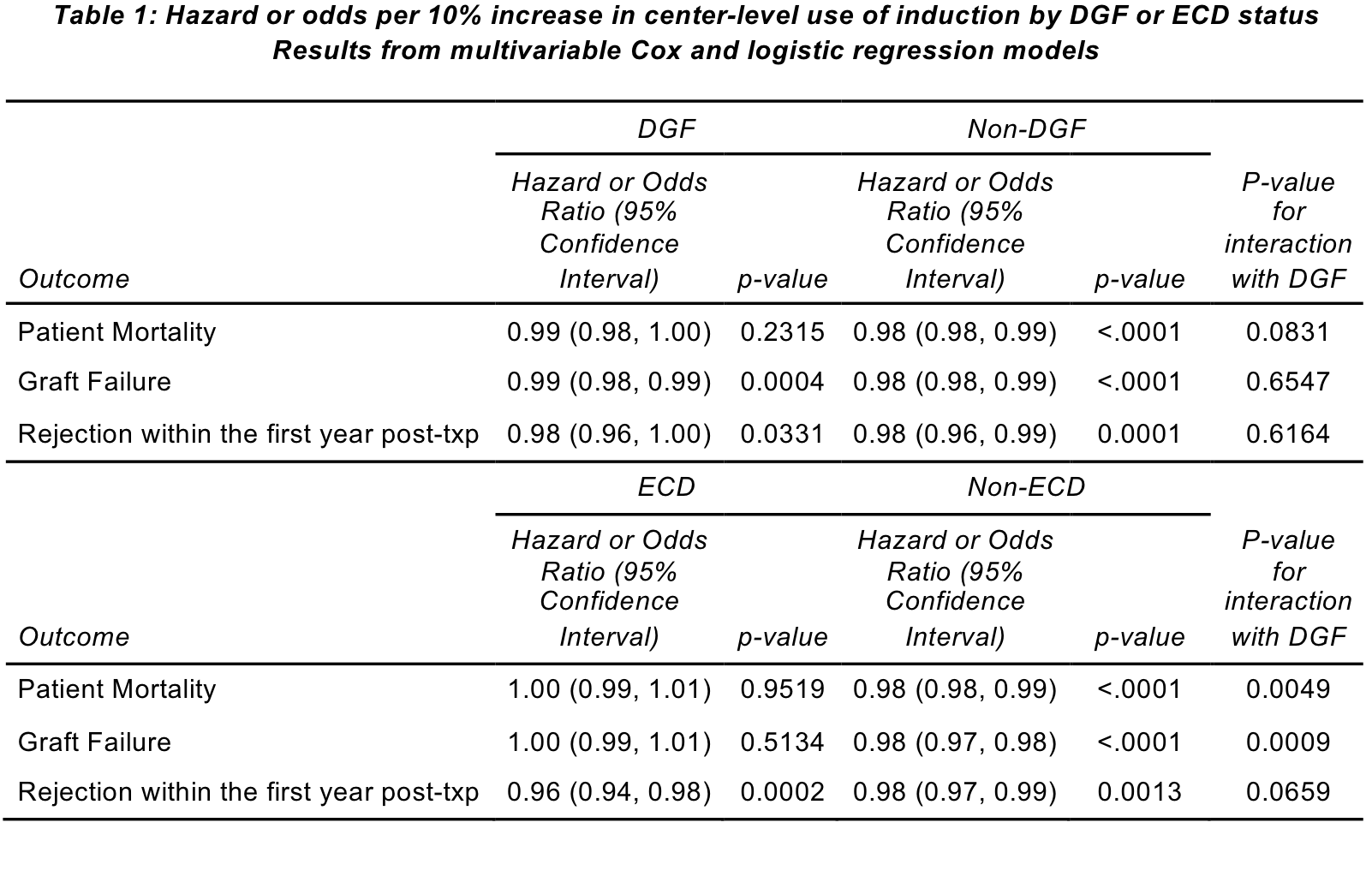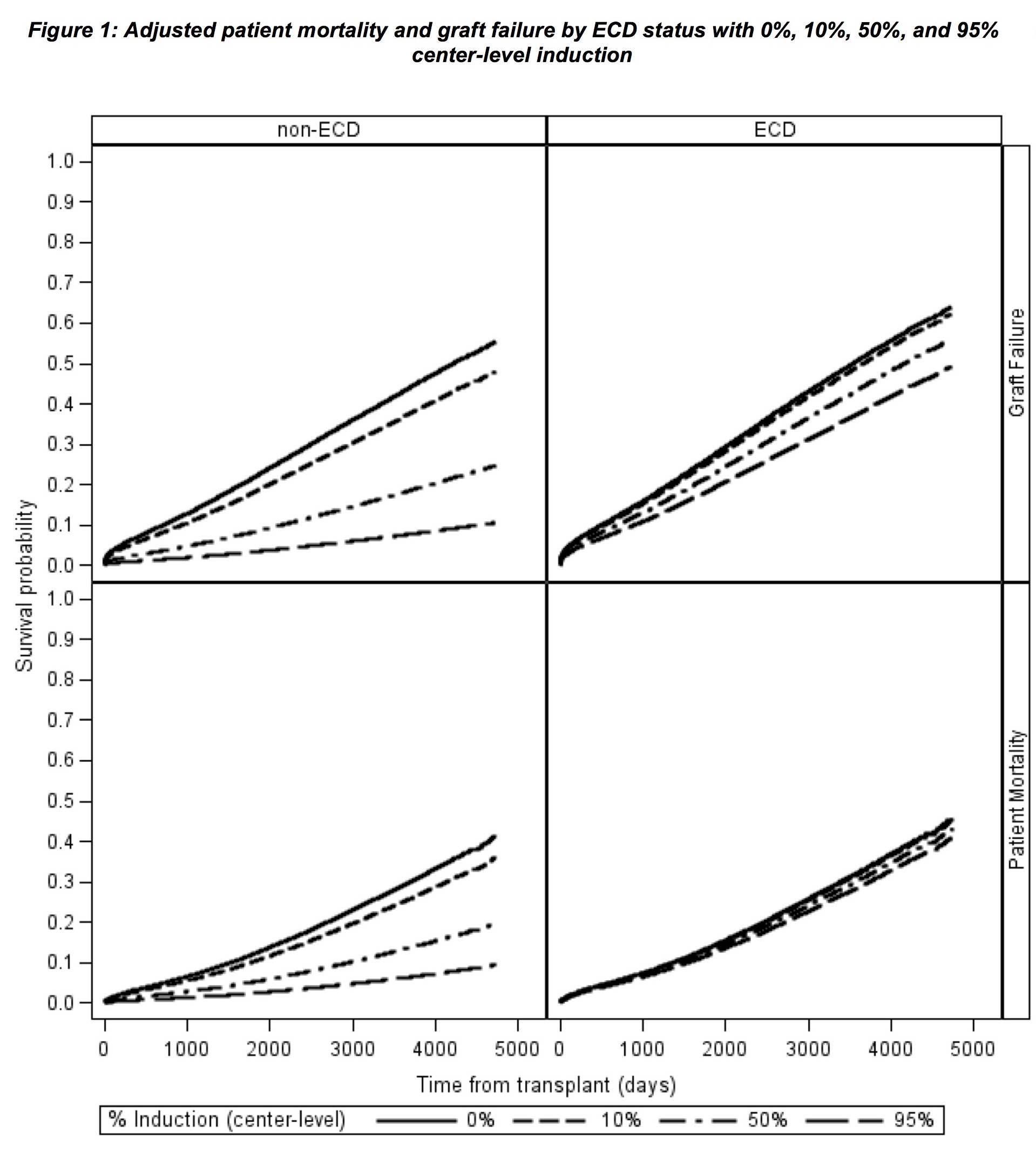Induction Immunotherapy in ECD and DGF Kidneys: Does ECD Equal Diminishing Induction Returns?
University of Michigan, Ann Arbo
Meeting: 2017 American Transplant Congress
Abstract number: B183
Keywords: Donors, Graft function, Induction therapy, Kidney transplantation, marginal
Session Information
Session Name: Poster Session B: Kidney Immunosuppression: Induction Therapy
Session Type: Poster Session
Date: Sunday, April 30, 2017
Session Time: 6:00pm-7:00pm
 Presentation Time: 6:00pm-7:00pm
Presentation Time: 6:00pm-7:00pm
Location: Hall D1
The benefit of induction immunotherapy to prevent DGF or mitigate its effects in recipients of marginal kidneys is not well understood and practices vary. We sought to investigate the impact of induction immunosuppression on recipients of DGF and ECD kidneys, hypothesizing that antibody induction provides benefit for these populations.
Methods: Using data from the Scientific Registry of Transplant Recipients from January 2003-June 2016, deceased donor kidney transplants (n=115,485) were analyzed. Potential differences in effects of center-level induction immunosuppression recipients were assessed using multivariate Cox and logistic regressions with interaction terms. Outcomes included acute rejection within one-year post-transplant (AR), graft failure (GF), and patient mortality (PM).
Results: 80% of ECD (n=20,008) and 81% of DGF (n=29,331) kidneys received induction immunotherapy. Overall, increasing percentage of center-level induction was associated with lower risk of GF and PM. While this association was similar in DGF and non-DGF recipients (interaction p-values>0.05, Table 1), the risk reduction was not observed in ECD recipients (GF and PM HRs=1.00, CIs=0.99-1.01, Table 1, Figure 1). Odds of AR were reduced by 2% per 10% increase in center level induction in DGF, non-DGF, and non-ECD recipients, and interestingly showed a trend towards even lower odds in ECD recipients (OR=0.96, interaction p-value = 0.0659).
 Conclusions: The positive association of induction immunosuppression with transplant outcomes is not different between recipients with DGF and those without, and is absent in ECD kidney recipients. Thus, induction therapy policies specifically directed at DGF and ECD kidneys should be carefully considered.
Conclusions: The positive association of induction immunosuppression with transplant outcomes is not different between recipients with DGF and those without, and is absent in ECD kidney recipients. Thus, induction therapy policies specifically directed at DGF and ECD kidneys should be carefully considered.
CITATION INFORMATION: Barrett M, Smith A, Woodside K, Sung R. Induction Immunotherapy in ECD and DGF Kidneys: Does ECD Equal Diminishing Induction Returns? Am J Transplant. 2017;17 (suppl 3).
To cite this abstract in AMA style:
Barrett M, Smith A, Woodside K, Sung R. Induction Immunotherapy in ECD and DGF Kidneys: Does ECD Equal Diminishing Induction Returns? [abstract]. Am J Transplant. 2017; 17 (suppl 3). https://atcmeetingabstracts.com/abstract/induction-immunotherapy-in-ecd-and-dgf-kidneys-does-ecd-equal-diminishing-induction-returns/. Accessed February 23, 2026.« Back to 2017 American Transplant Congress
